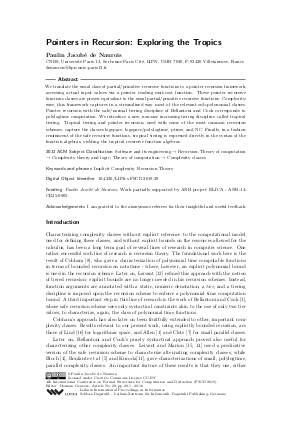Pointers in Recursion: Exploring the Tropics
Author Paulin Jacobé de Naurois
-
Part of:
Volume:
4th International Conference on Formal Structures for Computation and Deduction (FSCD 2019)
Part of: Series: Leibniz International Proceedings in Informatics (LIPIcs)
Part of: Conference: Formal Structures for Computation and Deduction (FSCD) - License:
 Creative Commons Attribution 3.0 Unported license
Creative Commons Attribution 3.0 Unported license
- Publication Date: 2019-06-18
File

PDF
LIPIcs.FSCD.2019.29.pdf
- Filesize: 487 kB
- 18 pages
Document Identifiers
Subject Classification
ACM Subject Classification
- Software and its engineering → Recursion
- Theory of computation → Complexity theory and logic
- Theory of computation → Complexity classes
Keywords
- Implicit Complexity
- Recursion Theory
Metrics
- Access Statistics
-
Total Accesses (updated on a weekly basis)
0PDF Downloads0Metadata Views
Abstract
We translate the usual class of partial/primitive recursive functions to a pointer recursion framework, accessing actual input values via a pointer reading unit-cost function. These pointer recursive functions classes are proven equivalent to the usual partial/primitive recursive functions. Complexity-wise, this framework captures in a streamlined way most of the relevant sub-polynomial classes. Pointer recursion with the safe/normal tiering discipline of Bellantoni and Cook corresponds to polylogtime computation. We introduce a new, non-size increasing tiering discipline, called tropical tiering. Tropical tiering and pointer recursion, used with some of the most common recursion schemes, capture the classes logspace, logspace/polylogtime, ptime, and NC. Finally, in a fashion reminiscent of the safe recursive functions, tropical tiering is expressed directly in the syntax of the function algebras, yielding the tropical recursive function algebras.
Cite As Get BibTex
Paulin Jacobé de Naurois. Pointers in Recursion: Exploring the Tropics. In 4th International Conference on Formal Structures for Computation and Deduction (FSCD 2019). Leibniz International Proceedings in Informatics (LIPIcs), Volume 131, pp. 29:1-29:18, Schloss Dagstuhl – Leibniz-Zentrum für Informatik (2019)
https://doi.org/10.4230/LIPIcs.FSCD.2019.29
BibTex
@InProceedings{jacobedenaurois:LIPIcs.FSCD.2019.29,
author = {Jacob\'{e} de Naurois, Paulin},
title = {{Pointers in Recursion: Exploring the Tropics}},
booktitle = {4th International Conference on Formal Structures for Computation and Deduction (FSCD 2019)},
pages = {29:1--29:18},
series = {Leibniz International Proceedings in Informatics (LIPIcs)},
ISBN = {978-3-95977-107-8},
ISSN = {1868-8969},
year = {2019},
volume = {131},
editor = {Geuvers, Herman},
publisher = {Schloss Dagstuhl -- Leibniz-Zentrum f{\"u}r Informatik},
address = {Dagstuhl, Germany},
URL = {https://drops.dagstuhl.de/entities/document/10.4230/LIPIcs.FSCD.2019.29},
URN = {urn:nbn:de:0030-drops-105360},
doi = {10.4230/LIPIcs.FSCD.2019.29},
annote = {Keywords: Implicit Complexity, Recursion Theory}
}
Author Details
Funding
- Jacobé de Naurois, Paulin: Work partially supported by ANR project ELICA - ANR-14-CE25-0005.
Acknowledgements
I am grateful to the anonymous referees for their insightful and useful feedback.
References
- Bill Allen. Arithmetizing Uniform NC. Ann. Pure Appl. Logic, 53(1):1-50, 1991. URL: http://dx.doi.org/10.1016/0168-0072(91)90057-S.
-
S. Bellantoni. Predicative Recursion and Computational Complexity. PhD thesis, University of Toronto, 1992.

-
Stephen Bellantoni and Stephen A. Cook. A New Recursion-Theoretic Characterization of the Polytime Functions. Computational Complexity, 2:97-110, 1992.

- Stephen A. Bloch. Function-Algebraic Characterizations of Log and Polylog Parallel Time. Computational Complexity, 4:175-205, 1994. URL: http://dx.doi.org/10.1007/BF01202288.
- Guillaume Bonfante, Reinhard Kahle, Jean-Yves Marion, and Isabel Oitavem. Two function algebras defining functions in NC^k boolean circuits. Inf. Comput., 248:82-103, 2016. URL: http://dx.doi.org/10.1016/j.ic.2015.12.009.
- Ashok K. Chandra, Dexter Kozen, and Larry J. Stockmeyer. Alternation. J. ACM, 28(1):114-133, 1981. URL: http://dx.doi.org/10.1145/322234.322243.
-
P. Clote. Sequential, machine-independent characterizations of the parallel complexity classes ALOGTIME, AC^k, NC^k and NC. Feasible Mathematics, Birkhaüser, 49-69, 1989.

-
A. Cobham. The intrinsic computational difficulty of functions. In Y. Bar-Hillel, editor, Proceedings of the International Conference on Logic, Methodology, and Philosophy of Science, pages 24-30. North-Holland, Amsterdam, 1962.

- Martin Hofmann. Linear types and non-size-increasing polynomial time computation. Inf. Comput., 183(1):57-85, 2003. URL: http://dx.doi.org/10.1016/S0890-5401(03)00009-9.
- Martin Hofmann and Ulrich Schöpp. Pure pointer programs with iteration. ACM Trans. Comput. Log., 11(4):26:1-26:23, 2010. URL: http://dx.doi.org/10.1145/1805950.1805956.
- Satoru Kuroda. Recursion Schemata for Slowly Growing Depth Circuit Classes. Computational Complexity, 13(1-2):69-89, 2004. URL: http://dx.doi.org/10.1007/s00037-004-0184-4.
- Daniel Leivant. A Foundational Delineation of Computational Feasiblity. In Proceedings of the Sixth Annual Symposium on Logic in Computer Science (LICS '91), Amsterdam, The Netherlands, July 15-18, 1991, pages 2-11. IEEE Computer Society, 1991. URL: http://dx.doi.org/10.1109/LICS.1991.151625.
-
Daniel Leivant and Jean-Yves Marion. Ramified Recurrence and Computational Complexity II: Substitution and Poly-Space. In Leszek Pacholski and Jerzy Tiuryn, editors, CSL, volume 933 of Lecture Notes in Computer Science, pages 486-500. Springer, 1994.

- Daniel Leivant and Jean-Yves Marion. A characterization of alternating log time by ramified recurrence. Theor. Comput. Sci., 236(1-2):193-208, 2000. URL: http://dx.doi.org/10.1016/S0304-3975(99)00209-1.
- Daniel Leivant and Jean-Yves Marion. Ramified Recurrence and Computational Complexity IV : Predicative Functionals and Poly-Space. Information and Computation, page 12 p, 2000. to appear. Article dans revue scientifique avec comité de lecture. URL: https://hal.inria.fr/inria-00099077.
-
J. C. Lind. Computing in logarithmic space. Technical report, Massachusetts Institute of Technology, 1974.

- Peter Møller Neergaard. A Functional Language for Logarithmic Space. In Wei-Ngan Chin, editor, Programming Languages and Systems: Second Asian Symposium, APLAS 2004, Taipei, Taiwan, November 4-6, 2004. Proceedings, volume 3302 of Lecture Notes in Computer Science, pages 311-326. Springer, 2004. URL: http://dx.doi.org/10.1007/978-3-540-30477-7_21.
- Walter L. Ruzzo. On Uniform Circuit Complexity. J. Comput. Syst. Sci., 22(3):365-383, 1981. URL: http://dx.doi.org/10.1016/0022-0000(81)90038-6.
